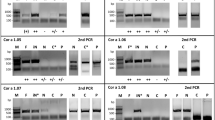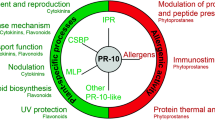Abstract
Kiwellin proteins of plants have previously been recognized as important human allergens, however their biological role remained unknown. Here, we discuss recent progress towards an understanding of their role as plant-defense proteins towards pathogenic fungi and beyond.
Similar content being viewed by others
Literatur
Tamburrini M, Cerasuolo I, Carratore V et al. (2005) Kiwellin, a novel protein from kiwi fruit. Purification, biochemical characterization and identification as an allergen. Protein J 24:423–429
Offermann LR, Giangrieco I, Perdue ML et al. (2015) Elusive structural, functional, and immunological features of Act d 5, the green kiwifruit kiwellin. J Agric Food Chem 63:6567–6576
Djamei A, Schipper K, Rabe F et al. (2011) Metabolic priming by a secreted fungal effector. Nature 478:395–398
Kumar D (2014) Salicylic acid signaling in disease resistance. Plant Sci 228:127–134
Sträter N, Schnappauf G, Braus G et al. (1997) Mechanisms of catalysis and allosteric regulation of yeast chorismate mutase from crystal structures. Structure 5: 1437–1452
Han X, Altegoer F, Steinchen W et al. (2019) A kiwellin disarms the metabolic activity of a secreted fungal virulence factor. Nature 565:650–653
Draffehn AM, Li L, Krezdorn N et al. (2013) Comparative transcript profiling by SuperSAGE identifies novel candidate genes for controlling potato quantitative resistance to late blight not compromised by late maturity. Front Plant Sci 4:423
Author information
Authors and Affiliations
Corresponding author
Additional information
Danksagung
Wir bedanken uns bei Prof. Dr. Stefan Rensing, Philipps-Universität Marburg, und allen Autoren für die großartige Zusammenarbeit. Wir danken der Deutschen Forschungsgemeinschaft (DFG) im Rahmen des Sonderforschungsbereichs 987, der European Synchrotron Radiation Facility (ESRF) und der Max-Planck-Gesellschaft für Unterstützung sowie der LOEWE-Förderung des Landes Hessen für die Strukturförderung. X. Han wurde durch ein Stipendium des China Scholarship Council gefördert.
Gert Bange 1997–2002 Biochemiestudium an der Universität Halle/Saale. 2007 Promotion bei Prof. Dr. I. Sinning an der Universität Heidelberg; dort danach Postdoc und Peter und Traudl Engelhorn-Stipendiat. 2013–2017 unabhängiger Forschungsgruppenleiter am Zentrum für Synthetische Mikrobiologie (SYNMIKRO) in Marburg. Seit 2018 als W3-Professor für Biochemie am SYNMIKRO und dem Fachbereich Chemie an der Universität Marburg.
Xiaowei Han 2006–2010 Bachelor in Landwirtschaft an der Northwest A & F University, China. 2010–2013 Master of Science at Shandong University, China. 2013–2017 Promotion (PhD) bei Prof. Dr. R. Kahmann am Max-Planck-Institut für terrestrische Mikrobiologie, Marburg, gefördert durch ein Stipendium des China Scholarship Council. Seitdem Postdoc bei Prof. Dr. R. Kahmann.
Regine Kahmann 1968–1972 Biologiestudium an der Universität Göttingen, 1974 Promotion bei Prof. Dr. T. A. Trautner am Max-Planck-Institut (MPI) für molekulare Genetik, Berlin; danach Postdoc und Junior-Gruppenleiter am Cold Spring Harbor Laboratory, USA (bis 1980) und wissenschaftliche Assistentin am MPI für Biochemie in Martinsried. 1982–1987 selbstständige Gruppenleiterin am Otto-Warburg-Laboratorium der Max-Planck-Gesellschaft (MPG) am MPI für molekulare Genetik in Berlin, danach bist 1992 selbstständige Gruppenleiterin am IGF Berlin GmbH. 1992–2001 C4/W3-Professorin für Genetik an der LMU München. Seit 2000 wissenschaftliches Mitglied der MPG und Direktorin am MPI für terrestrische Mikrobiologie in Marburg, seit 2001 W3-Professorin für Genetik an der Universität Marburg.
Florian Altegoer 2007–2013 Biologiestudium an der Ruhr-Universität Bochum und der Universität Göteborg, Schweden. 2017 Promotion bei Prof. Dr. G. Bange an der Universität Marburg, anschließend Postdoc und Peter und Traudl Engelhorn-Stipendiat am Zentrum für Synthetische Mikrobiologie und dem Max-Planck-Institut für terrestrische Mikrobiologie in Marburg.
Rights and permissions
About this article
Cite this article
Bange, G., Han, X., Kahmann, R. et al. Das Kiwellinprotein: über die biologische Funktion eines Allergens. Biospektrum 25, 372–374 (2019). https://doi.org/10.1007/s12268-019-1060-8
Published:
Issue Date:
DOI: https://doi.org/10.1007/s12268-019-1060-8




